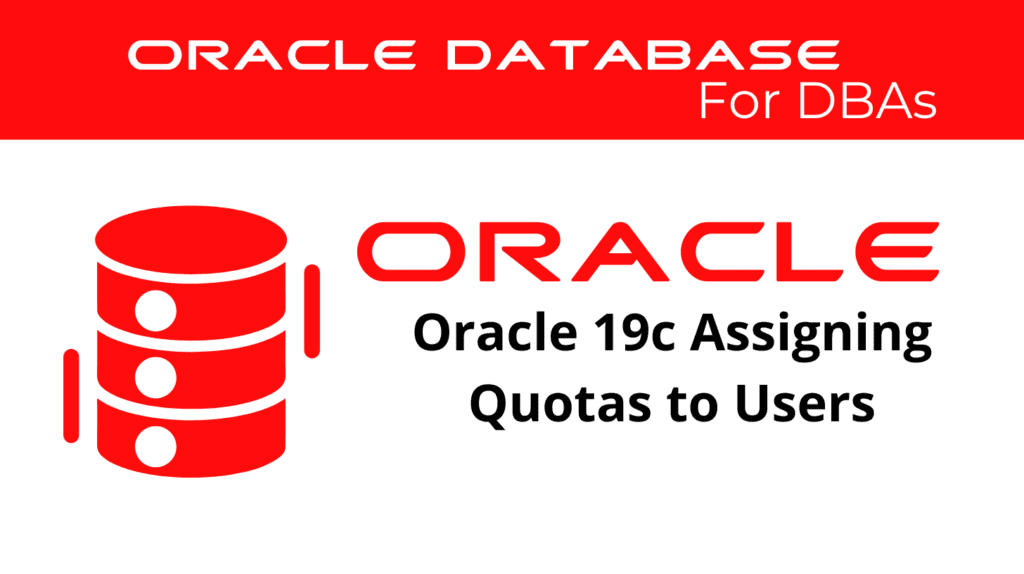
Managing user quotas in Oracle 19c is essential for effective database storage management and ensuring optimal resource allocation. This guide will provide a comprehensive walkthrough on how to Assign Quotas and manage User Quotas, ensuring that database administrators can efficiently handle storage quotas.
Understanding User Quotas
User Quotas in Oracle 19c allow database administrators to control and allocate storage space to different users. By assigning quotas, DBAs can ensure that no single user consumes more than their fair share of resources, thus maintaining balanced and efficient storage usage across the database.
Benefits of Assigning Quotas
- Resource Management: Ensures equitable distribution of storage resources among users.
- Prevent Overuse: Prevents any single user from monopolizing database storage.
- Optimized Performance: Helps maintain overall database performance by managing storage efficiently.
Steps to Assign Quotas
Step 1: Identify the Tablespace
Before assigning quotas, determine the tablespace to which the quotas will be applied.
Identify Tablespace:
SQL> SELECT TABLESPACE_NAME FROM DBA_TABLESPACES;
Step 2: Assign Quota to User
Assign the quota to the user for the specified tablespace.
Assign Quota:
SQL> ALTER USER username QUOTA size [K | M | G] ON tablespace_name;
Example:
SQL> ALTER USER john QUOTA 100M ON users;
Step 3: Verify Quota Assignment
Verify that the quota has been correctly assigned to the user.
Verify Quota:
SQL> SELECT USERNAME, TABLESPACE_NAME, BYTES, MAX_BYTES FROM DBA_TS_QUOTAS WHERE USERNAME = 'username';
Example:
SQL> SELECT USERNAME, TABLESPACE_NAME, BYTES, MAX_BYTES FROM DBA_TS_QUOTAS WHERE USERNAME = 'JOHN';
📢 You might also like: Oracle 19c Applying the Principle of Least Privilege (Category: Oracle Database Admin)
Managing User Quotas
Assign Quotas – Effective management of user quotas involves monitoring and adjusting quotas as necessary to ensure optimal storage usage.
Monitor Quotas:
Regularly check the quota usage to identify any users approaching their quota limits.
Monitoring Quotas:
SQL> SELECT USERNAME, TABLESPACE_NAME, BYTES, MAX_BYTES FROM DBA_TS_QUOTAS;
Adjust Quotas:
To Adjust the quotas based on the user’s needs and overall storage availability.
Adjust Quota:
SQL> ALTER USER username QUOTA new_size [K | M | G] ON tablespace_name;
Example:
SQL> ALTER USER john QUOTA 200M ON users;
Advanced Quota Management
Assign Quotas – For more advanced quota management, consider using profiles to manage users quotas dynamically based on their roles and responsibilities.
Creating a Profile:
Create a profile that includes specific quota limits and assign it to the user.
Create Profile:
SQL> CREATE PROFILE profile_name LIMIT SESSIONS_PER_USER 10 CPU_PER_SESSION 1000000 LOGICAL_READS_PER_SESSION 10000;
SQL> ALTER USER username PROFILE profile_name;
Example:
SQL> CREATE PROFILE dev_profile LIMIT SESSIONS_PER_USER 10 CPU_PER_SESSION 1000000 LOGICAL_READS_PER_SESSION 10000;
SQL> ALTER USER john PROFILE dev_profile;
Verifying Quota Assignments
After assigning and adjusting quotas, it is crucial to verify that the quotas are enforced correctly.
Verify Quota Assignments:
SQL> SELECT USERNAME, TABLESPACE_NAME, BYTES, MAX_BYTES FROM DBA_TS_QUOTAS WHERE USERNAME = 'username';
Example:
SQL> SELECT USERNAME, TABLESPACE_NAME, BYTES, MAX_BYTES FROM DBA_TS_QUOTAS WHERE USERNAME = 'JOHN';
Conclusion
Assigning quotas in Oracle 19c is a vital task for managing storage resources effectively. By following the steps outlined in this guide, DBAs can efficiently Assign Quotas and manage User Quotas, ensuring balanced and optimized storage usage.
Start leveraging Quota Assignment and Storage Quotas in your Oracle environment today to enhance your database management capabilities and ensure equitable resource distribution.
See more on Oracle’s website!
Be Oracle Database Certified Professional, this world is full of opportunities for qualified DBAs!





